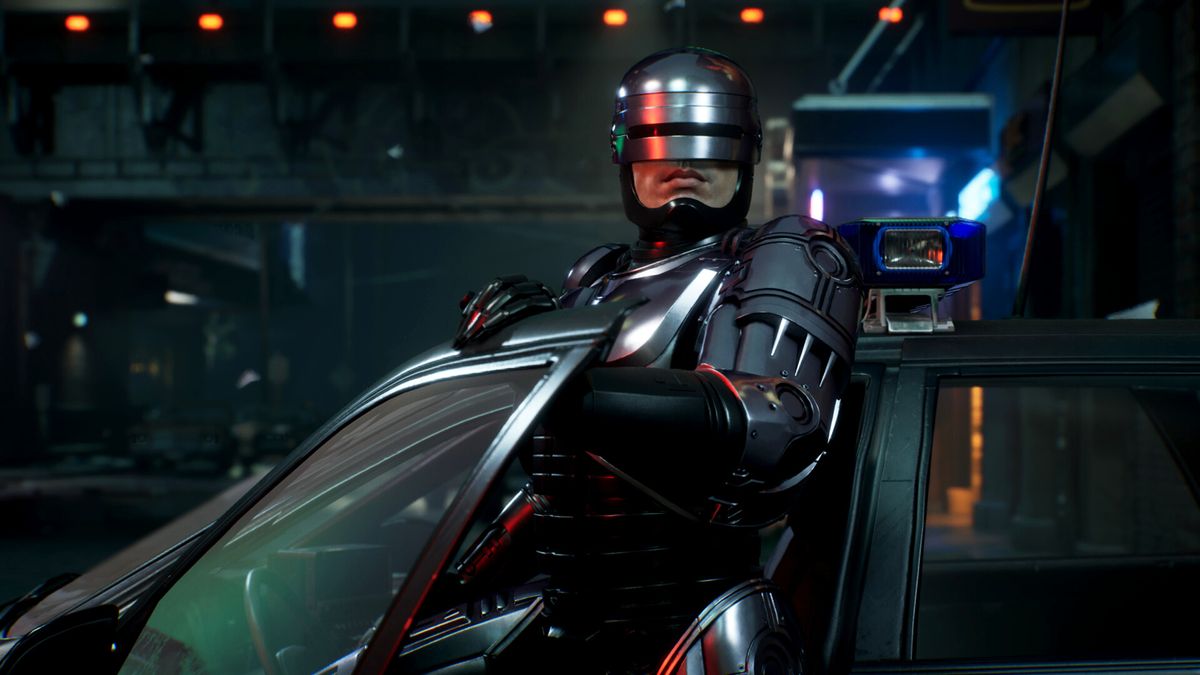12DOVE Verdict
Robocop: Rogue City reflects its protagonist's qualities. It's well-built and robust, a few glitches aside, and capable of triggering explosive action. Yet it's also mechanical in its design, its dialogue slow and plodding, and limited in its forms of interaction. Short on engaging mission design and the film's punchy satire, Detroit's finest needs better backup to enliven this drawn out adventure.
Pros
- +
Shootouts are busy and explosive
- +
Robocop remains an interesting character
Cons
- -
Missions are bloated with busywork
- -
A limited range of detective and combat tools
- -
Lacks the satirical bite of its source material
Why you can trust 12DOVE
Clump, clump, clump. If there's one sound effect that will echo in your brain after playing Robocop: Rogue City, it's the dull thud of metal booted footsteps. That's because they emanate from Robocop himself, of course, going wherever you go. But also because they set the rhythm for a first-person action adventure that's sturdy yet slow and monotonous. When you're not gunning down mobs, you spend a lot of time in Rogue City just clumping – clump over there to scan something, clump here to pick something up. The pace is plodding in quite a literal sense.
Release date: November 2, 2023
Platform(s): PC, PS5, Xbox Series X
Developer: Teyon
Publisher: Nacon
You can see what developer Teyon is going for, though. Rather than the classic arcade-style Robocop game, this is an attempt to flesh out the concept, painting a complete picture of Robo's police work and his part man, part machine presence in the precinct. In the police station between missions, you thus stop to help out colleagues. And once you hit the streets, there are opportunities to deal with the general public and various misdemeanors before taking out the trash.
On paper, it's not a bad idea, not least because placing the blunt object that is Robocop into trivial or delicate situations points to a rich vein of humor. But unlike the way, say, Marvel's Midnight Suns plays with the dissonance between super-powered action and mundane concerns, Rogue City is itself too heavy-footed to muster the needed finesse.
Thank you for your cooperation
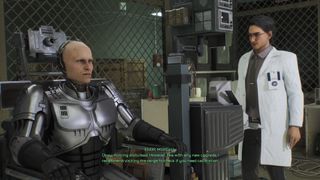
It doesn't help that the game is constrained by relatively low production values for a title of its scope, comprising several sizable locations, an extensive speaking cast, and a run time of some 20 hours. In still screenshots it looks the part, capturing some of the original film's '80s style in its locations and fidelity in its facial modeling. Yet it struggles to maintain the quality with its animation, script, and voice work.
The writing is especially flat (as well as confusing at times thanks to some overzealous editing), as much of the stabbing satire that makes the movie so darkly hilarious is substituted for weak skits and bland conversation. Take one of the first optional tasks you can accept, for example, manning the reception desk at the station. A shifty looking punk approaches, saying he wants to collect the rewards for information on a known fugitive. The punchline? He is the fugitive, and he wants to collect the reward on himself. Oh my sides.
A little later, you might choose to clump hither and thither collecting signatures on a get well soon card for your wounded partner. Yes, really. The goal here is presumably to underline the kinship that runs through the precinct, but each dialogue exchange is too stilted and facile to achieve such ends, and there's more emotional texture in Robo's synthesized voice than in those of the caricatures around him.
Indeed, Robocop himself, voiced by original actor Peter Weller, is the one element worth salvaging from the cutscenes and conversations. His coldly dehumanizing yet effective attitude to crime – terms like scumbag and slimeball abound – continues to parody the Reaganite tone of an '80s action film, while the remnants of his human brain enable the plot to juggle nimbly with the question of who or what he really is. Even then, though, the game's tone misses the grimy wickedness of its source material. Robocop is too measured in his responses to minor crimes, for instance, issuing parking tickets like a dutiful traffic warden when he should be shooting out tires.
Stay out of trouble
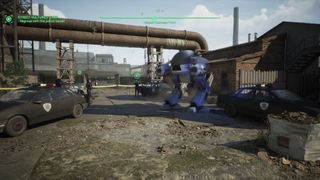
The missions where you head out to open (and eerily silent) areas of old Detroit miss the mark most of all, in fact. Perhaps you want to help train a rookie officer by searching for an old lady's lost cat in the basement of her apartment block? Or perhaps not, because it's exactly as dull as it sounds. The vacuousness of such scenes is only underlined by Robocop: Rogue City's exceedingly thin investigation mechanics. Whether you're tracking a moggy or a murderer, you merely traipse around a designated area – clump, clump, clump – looking for highlighted objects then scanning them.
The only incentive for detective work, then, whether it's the optional kind or part of the critical path, is the reward you receive upon completion. Experience points mean upgrades to Robo's systems, from healing to scanning to conversation, some of which are genuinely useful, including a temporary shield or burst of slow motion in combat. Dialogues, meanwhile, involve choices that may improve your relationships with key characters, or fulfill prime directives (although curiously, those are often in opposition – showing mercy 'serves the public trust', while being a stickler for the rules 'upholds the law'). Some of the side stories, such as that of an investigative journalist, are even mildly intriguing, although it's not until late in the game that you'll see the outcomes of your decisions.
And of course, none of that makes the clumping work itself compelling. Astral Chain showed four years ago that games can fold everyday law enforcement around spectacular battles, by providing a multi-purpose suite of skills. Robocop: Rogue City is let down here in that respect. He should have more versatility beyond his sidearm and his 'Robocop vision', but rarely does the quest design give him much else to do. In cutscenes, you hear mention of his temperature sensors, for example, or his ability to track the heartbeats of those nearby, but investigative situations are never built around these skills.
Your move, creep
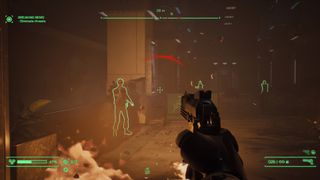
At this point you may be thinking, 'This is all very well, but what about the action?' If so, you've already got a taste of what it feels like to play Robocop: Rogue City. But sure, what about the action? Well, actually there is plenty of it amongst everything else – probably a fairly even split with the busywork and tortured plot wranglings – and it's fine as far as it goes. Yet it may also leave you wondering whether Robocop is really cut out to star in such a lengthy campaign.
The typical modern FPS protagonist, you see, is highly mobile and adaptable. They sprint, jump, and crouch behind cover, and have access to a whole arsenal of guns and grenades. Even the beefy Master Chief has a grapple wire to help him scoot about these days. In contrast, Robocop is a slab of concrete, one rung up from a Dalek in terms of maneuverability. His special power comes from soaking up bullets and outgunning opponents with this Auto-9 pistol, which comes here with infinite ammo.
As such, then, shootouts in Robocop: Rogue City are more like shooting galleries, as you clump from behind cover, aim down sights to outline perps in phosphor green, then let rip. Chances are you'll take some damage from return fire – forget ducking or strafing – but Robo's health depletes slowly against all but the heaviest of ordnance, so as long as your aim is true you should take it in your pneumatic stride. True to the character it may be, but dynamic it is not.
In most combat scenes, in fact, there's more life in the scenery than anywhere else. Chunks of plaster explode from columns being used as cover, machine gun placements chew through wood-paneled walls. Stuff tends to explode a lot too, from parked cars to fire extinguishers, the latter arcing like rebellious fireworks, taking a punk or two down with them. The drug-fuelled gangsters themselves, though, can be remarkably static, even standing in place like mannequins until you enter their line of sight. Others do shuffle around, and some take advantage of a location's verticality, firing from above. But mostly, you point, shoot, heal, clump on.

At times, you might decide to scoop up a second weapon from a fallen foe to handle a tricky situation, but more usually Auto-9 is the only tool you need, especially once you've upgraded it (one of the most diverting tasks in the game involves arranging chips on the gun's PCB to power it up in different ways). On Normal difficulty at least, stomping around hammering fire is a surprisingly adequate means of survival. So much so that I snapped out of my reverie when one stage introduced land mines and snipers that made me watch my step and carefully stick to cover.
The challenge does get fiercer in later stages, but rarely more complex or imaginative, and there's never any real wallop in battles, despite all the booms and bangs. The dramatic way enemies fall from balconies when shot is a nice touch, and punk heads burst with red particles (strangely, leading them to shout out dying words after they've lost their mouths), but overall the kinetic brutality that's so core to the film is absent. Nothing here conveys the underlying horror of having heavily armed machines police the streets. Even a reenactment of ED-209's '20 seconds to comply' scene is a damp squib.
Perhaps that was always going to be the case when making a fully-featured Robocop sim, however. In film, his methods contrast absurdly with those of the average fictional detective characters, or drag the work of violent cops such as Dirty Harry to its ridiculous endpoint. In a game, storming off alone into a hostage situation to kill everyone feels par for the course, and Robocop even seems limited in the range of violence at his disposal. Perhaps a Robocop game needs to be tighter, bolder and more devilish to make its mark. Robocop: Rogue City is flat, heavy, lifeless. Like a metal boot. Clump.
Disclaimer
Robocop: Rogue City was reviewed on PS5, with code provided by the publisher.
More info
| Genre | FPS |
Jon Bailes is a freelance games critic, author and social theorist. After completing a PhD in European Studies, he first wrote about games in his book Ideology and the Virtual City, and has since gone on to write features, reviews, and analysis for Edge, Washington Post, Wired, The Guardian, and many other publications. His gaming tastes were forged by old arcade games such as R-Type and classic JRPGs like Phantasy Star. These days he’s especially interested in games that tell stories in interesting ways, from Dark Souls to Celeste, or anything that offers something a little different.
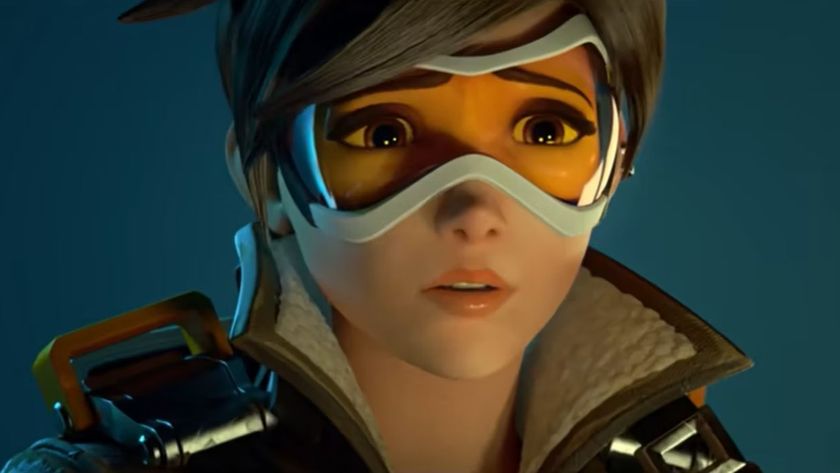
After struggling to make sequel-sized changes, fans think Blizzard might retire the '2' in Overwatch's name based on Season 16 leaks
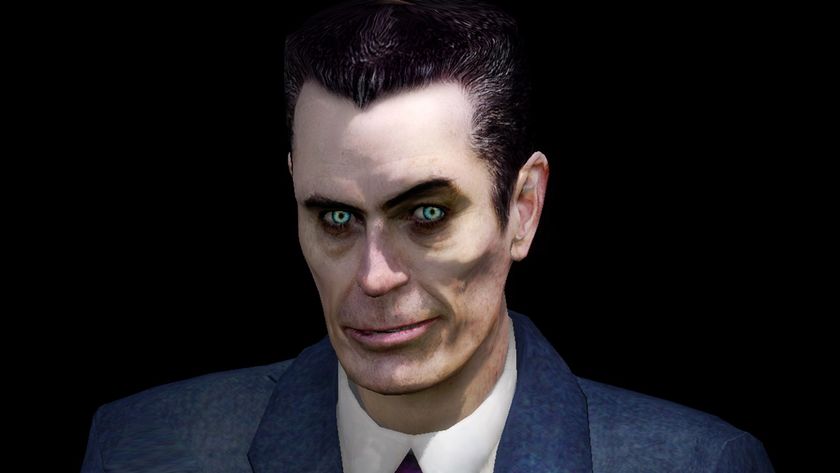
Valve leads considered making a "mediocre" game before Half-Life to build the team up, but original marketing exec said "if you do that, the company will fail"
